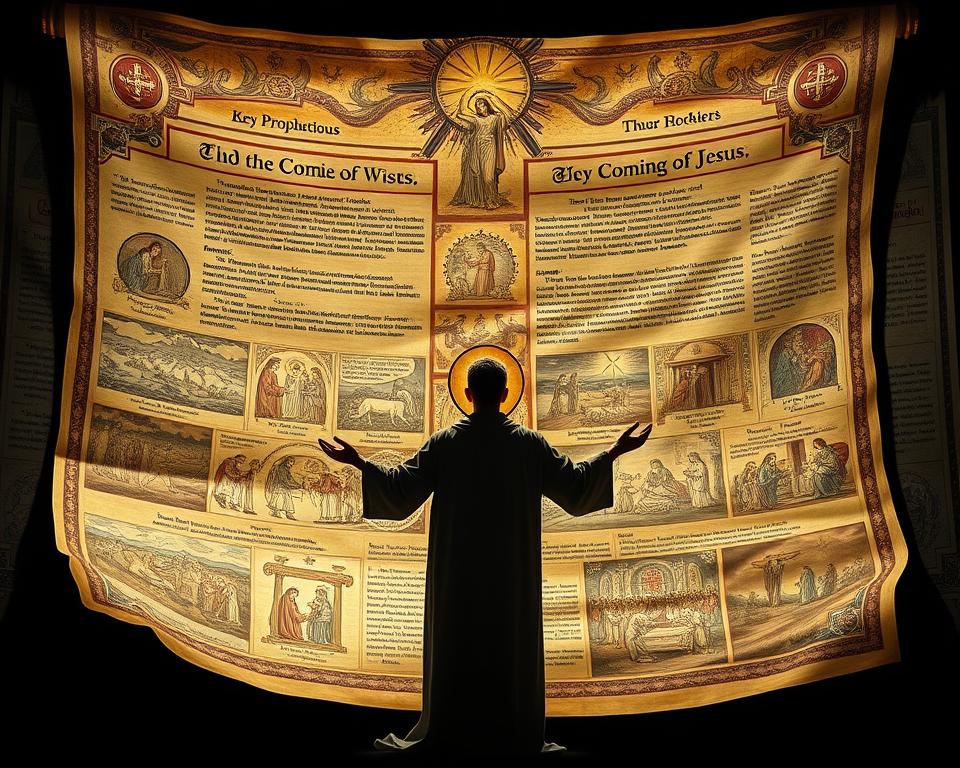Have you ever wondered how ancient texts relate to today’s world? Scripture offers clarity on global events, especially regarding harmony among nations. Many seek answers as conflicts rise, but faith provides a lens to understand God’s plan.
Daniel’s 70-weeks prophecy, for example, ties directly to modern peace efforts. With 483 years already fulfilled, the remaining seven-year period holds significance. This unfulfilled covenant points to a pivotal time ahead.
Current negotiations, like those in the Middle East, echo these patterns. Recognizing them helps believers stay grounded in truth. Let’s explore how divine wisdom sheds light on the future.
Understanding Prophecies of Peace in the Bible
Scripture reveals a profound vision for harmony that transcends time. Unlike fleeting human treaties, God’s promise of *shalom* encompasses wholeness—physical, emotional, and relational wellbeing. This divine blueprint appears repeatedly, offering clarity amid chaos.
The Biblical Definition of Peace
*Shalom* isn’t merely the absence of conflict. Isaiah 2:4 illustrates this vividly: nations will “beat swords into plowshares,” repurposing weapons for cultivation. Micah 4:3 echoes this, declaring people “will not learn war anymore.”

“My peace I give you… not as the world gives.”
Faith reminds us His covenant surpasses temporary solutions.
How Prophecies Offer Hope for the Future
Messianic promises anchor our confidence. Isaiah’s vision of weapons becoming tools shows dual fulfillment—partially in Christ’s first coming, fully in His return. This duality assures believers that God’s plan is unstoppable.
The Beatitudes reinforce this: “Blessed are the peacemakers” (Matthew 5:9). Divine sovereignty transforms the *world*, not through force but through redeemed hearts. Such prophecies fuel *hope* amid uncertainty.
Human efforts falter, but Scripture’s guarantees stand firm. Every prophecy points to a *future* where love overcomes strife. That’s the *peace* worth waiting for.
The Role of Daniel’s Prophecies in Peace
Few biblical passages clarify future events like Daniel’s 70-weeks prophecy. This divine timeline reveals God’s meticulous plan for the Jewish people and the world. With 483 years already fulfilled, the remaining seven point to a pivotal era ahead.

Daniel’s 70 Weeks and Their Significance
The prophecy in Daniel 9:27 divides 490 years into segments. The first 483 years began with Artaxerxes’ decree (445 BC) and ended at Jesus’ crucifixion. You’ll see God’s precision—exactly 483 years later, the Messiah arrived.
The final seven years remain unfulfilled. This time will begin when a global leader confirms a covenant with many. Midway through, the “abomination of desolation” will mark a turning point.
The Connection Between Peace and the End Times
Today’s Middle East negotiations mirror this prophetic framework. Efforts to rebuild the temple in Jerusalem signal progression toward the end. For the Jewish people, this holds deep significance.
“He will confirm a covenant with many for one ‘seven.’” —Daniel 9:27
Faith assures us God’s timeline remains exact. As events unfold, believers find hope in His unwavering promises.
The Final Seven-Year Peace Covenant
Daniel’s final seven-year period holds deep prophetic meaning for believers today. This unfulfilled segment points to a future agreement that will reshape the world. Unlike human treaties, God’s covenant reflects His unchanging plan.
Daniel 9:27 and Its Interpretation
The Hebrew phrase “confirm a covenant” (Daniel 9:27) implies strengthening an existing agreement. This suggests the final seven years build on prior divine promises. Human efforts often fail, but God’s timeline remains exact.
Paul’s warning in 1 Thessalonians 5:3 echoes this: “While people are saying, ‘Peace and safety,’ destruction will come.” Temporary lasting peace will mask deeper deception.
The Anti-Messiah’s Role in the Peace Treaty
A future leader will broker a false agreement, mimicking divine harmony. Joel 3:2 warns against dividing Israel—a boundary God Himself established. Modern peace middle east talks may foreshadow this pattern.
“I will judge nations… for scattering My people.” —Joel 3:2
Faith reminds us: true unity comes only through Christ. Political solutions cannot replace His eternal covenant.
Jesus’ Teachings on Peace
The *Prince of Peace* didn’t just preach—He embodied hope. From the Sermon on the Mount to His final words, Christ revealed God’s blueprint for true harmony. His life fulfilled prophecies spanning centuries, proving Scripture’s reliability.
The Fulfillment of Isaiah’s Vision
Isaiah 9:6 foretold a child called “Wonderful Counselor, Mighty God, Everlasting Father”—the *son* who would bring endless peace. Jesus’ birth in Bethlehem (Micah 5:2) and triumphal entry (Zechariah 9:9) confirmed this. He didn’t just teach *shalom*; He was *shalom*.
“Blessed are the peacemakers, for they will be called children of God.” —Matthew 5:9
Old Testament Promises, New Testament Reality
Daniel’s prophecy of the Messiah being “cut off” (Daniel 9:26) pointed to the cross. There, Jesus secured inner peace for all who trust Him. John 14:27 underscores this: “My peace I give you… not as the world gives.”
Human treaties fail, but God’s covenant lasts. When chaos swirls, His words anchor us. Prayers for personal peace—like Philippians 4:6-7—align us with His *hope* for a future without strife.
The Future of Israel and Peace
Modern diplomacy often clashes with ancient boundaries set by divine decree. Current efforts in the *middle east*, like Project Rozana’s medical collaborations, show goodwill. Yet Scripture warns against compromising God’s design for sacred *land*.
Human Plans vs. Divine Boundaries
The Arab Peace Initiative proposes *land swaps*, but Joel 3:2 condemns dividing Israel. God calls nations to account for scattering His people. You’ll see this tension in debates over 1967 borders.
Grassroots efforts, like Hadassah Hospital’s joint Arab-Jewish programs, reflect *hope*. Yet political treaties often repeat Oslo’s failures. The UN’s 160 conflicts since 1945 prove human solutions falter.
Third Temple Preparations and Prophecy
Rebuilding the temple aligns with Daniel’s timeline. These *events* signal progression toward the final covenant. Faith reminds us: true *peace middle east* comes only through Christ’s return.
“I will gather all nations… and enter into judgment with them.” —Joel 3:2
Warnings against *divide Israel* remain urgent. Human negotiations cannot override God’s eternal covenant. As believers, we anchor in His promises, not temporary treaties.
The Third Temple and Prophecies of Peace
Jerusalem’s temple holds more than historical value—it’s a cornerstone of future prophecy. For the *Jewish people*, rebuilding this sacred *house* symbolizes hope and divine fulfillment. Scripture ties its restoration to pivotal *events* in Daniel’s 70th week.
The Significance of the Temple in End-Time Prophecies
Solomon’s *house* of worship was more than a building. It represented God’s presence. Today, preparations by the Temple Institute—like crafting altar tools—signal a nearing *time* of fulfillment.
Key details from Revelation 11:1-2 and Daniel 9:27 align:
- Daily sacrifices: Restoring worship mirrors prophecy’s timeline.
- Measurements: Revelation’s temple dimensions hint at precision.
- Covenant confirmation: A future agreement will precede desecration.
The Abomination of Desolation
Jesus warned of this *end*-time *event* (Matthew 24:15). It marks when a false leader defiles the temple. Contrast this with biblical protocols:
“He will set up an abomination that causes desolation.” —Daniel 9:27
Discernment matters. Political solutions may mimic peace, but true harmony comes through Christ’s return. Watch for patterns, but anchor in God’s word.
Isaiah’s Vision of a Peaceful World
Isaiah paints a vivid picture of a world transformed by divine justice. You’ll see mountains symbolizing Christ’s government, where nations stream to learn God’s ways. This hope-filled prophecy contrasts sharply with today’s $1.9 trillion military spending.
The Mountain of the Lord’s House
Isaiah 2:1-4 describes all people flocking to Zion. Unlike failed UN efforts, Messiah’s reign brings lasting unity. The “mountain” represents His unshakable kingdom—higher than human politics.
From Swords to Plowshares
“They will beat their spears pruning hooks” (Isaiah 2:4). This isn’t poetry—it’s an economic paradigm shift. Redirecting global defense budgets could solve hunger 7 times over.
Ezekiel 39:9-10 echoes this after Gog-Magog’s defeat. Weapons become fuel for seven years. When Christ rules, lift sword nation becomes lift harvest baskets.
“Nation shall not lift sword against nation.” —Isaiah 2:4
Human attempts, like the UN’s bronze statue, falter. But Scripture’s vision stands firm. True transformation comes through divine authority, not treaties.
The Millennium: A Time of Perfect Peace
Corruption vanishes when the son rules from Jerusalem—literally. Scripture confirms His 1,000-year reign earth will transform every system. You’ll see justice replace greed, and faith guide every decision.
Global Governance Under Christ
Revelation 20:6 describes saints as co-rulers. Imagine mayors trained in Exodus 20’s laws—no lobbyists, only equity. Resources flow freely, like Micah 4:4’s vineyards.
Current legal systems pale next to God’s design. Courts won’t favor the wealthy. Technology ensures fair distribution, from food to energy.
From Battlefields to Harvest Fields
The end war isn’t symbolic. Isaiah 35:1-7 shows deserts blooming. Nations repurpose tanks for tractors, fulfilling Isaiah 2:4’s vision.
“Each will sit under their vine… no one will make them afraid.” —Micah 4:4
Pollution reverses as creation heals. This isn’t idealism—it’s God’s covenant. His word guarantees it.
Micah’s Prophecy of Peace
Eight centuries before Christ, Micah foresaw Jerusalem’s pivotal role. His words in chapters 4-5 reveal a dual fulfillment—both in Christ’s first coming and His future reign. You’ll notice striking parallels with Isaiah’s visions, yet Micah adds unique details about God’s plan for all people.
From Pilgrimage to Paradise
Micah 4:1-7 describes nations streaming to Zion in the “latter days.” This spans the church age through the millennium. Verse 2’s prophecy—”Many peoples will come”—finds partial fulfillment today as believers worldwide study God’s word.
Zechariah 14 adds geographic specifics: the Mount of Olives will split, creating a new valley. This transformed landscape will host international worship festivals, just as Micah predicted.
The Prince Who Guarantees Peace
Micah 5:5 confirms Christ’s role: “This man will be our peace.” The Hebrew word for house here implies dynasty—Jesus’ eternal kingship. His first coming brought inner peace; His return will establish global harmony.
“They will beat their swords into plowshares… neither shall they learn war anymore.” —Micah 4:3
How should we respond? Start by heeding Psalm 122:6—”Pray peace Jerusalem.” Support efforts that align with biblical guidance on justice, knowing God’s plan cannot fail. Though conflicts rage now, Micah’s vision stands as a divine guarantee.
How to Prepare for the Coming Peace
Faith isn’t passive; Scripture calls us to prepare for what’s ahead. God’s promises about harmony aren’t just for the future—they shape how we live faithfully now. Let’s explore practical ways to align our lives with His plan.
Living in Light of Biblical Prophecies
1 Thessalonians 5:6 urges watchfulness. Start by studying Scripture daily, especially passages about God’s covenant. Daniel and Isaiah reveal patterns that help us discern the times.
Practice reconciliation using Matthew 5:23-24. If conflicts arise, seek resolution quickly. This mirrors the hope of Christ’s ultimate restoration.
The Importance of Prayer for Peace
Psalm 122:6 commands us to “pray peace” for Jerusalem. Create a prayer calendar focusing on leaders in the Middle East. Ask God to guide their decisions.
Support Messianic congregations in Israel. Their work bridges divides, fulfilling Zechariah 12:10’s prophecy of revival. Small actions today echo eternity.
“Let us not sleep, as others do, but let us watch and be sober.”
As the coming era approaches, let your life reflect God’s promise. Anchor in His word, act in love, and trust His timeline.
The Hope of Lasting Peace in God’s Plan
God’s plan for the world offers unshakable hope amid uncertainty. Scripture assures us: trials are temporary, but His promises stand firm. Revelation 21:4 paints the ultimate future—no more tears, pain, or death.
True peace comes through Christ, the son who fulfills every prophecy. Romans 15:13 reminds us: the Spirit fills believers with joy and confidence. While human efforts fade, divine restoration lasts forever.
Today, you can join God’s work. Pray for leaders. Live as a peacemaker. Trust His timeline. As Numbers 6:24-26 says: “The Lord bless you and keep you.”
If you’ve never accepted Christ, Romans 10:9-10 invites you: confess Him as Lord. Step into His peace—now and for eternity.





